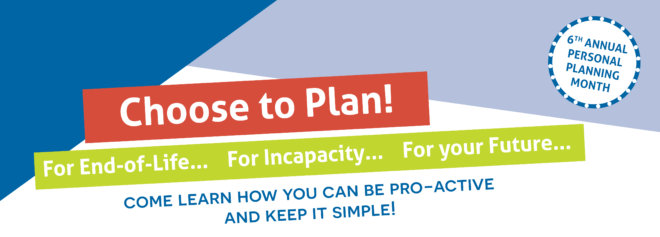Free Webinars on Personal Planning in October
by Nidus
Getting your affairs in order gives you peace of mind and takes the burden off family and friends. It’s easy when you know the steps to take. Participate in any of the free webinars by Nidus in October.

How?
3 ways to participate:
- Individually (watch on your own device) – sign up for each webinar.
- As a group (gather family/friends/colleagues and use your own device) – sign up for each webinar.
- Attend public viewing at a host location. Click here to view the list of host locations. Can’t find one near you? Ask your public library or community organization to be a host and tell them to contact info@nidus.ca.
What are the topics? When?
Each webinar topic will be available twice – morning & evening, on different dates. All times listed are for Pacific Time. You can ask questions at the end of each webinar during the Q&A period.
Joint ownership – the good, the bad, and the risky
Joint ownership of bank accounts, real estate, and vehicles is common for spouses. How is this different when a parent and child own property jointly? Learn about recent court cases that have led to new cautions about joint ownership. Find out the original intent of joint ownership and why it may not fit for today’s needs.
- Tuesday, Oct 1 | 10:30 am–12:00 pm (morning) – click to sign up
- Thursday, Oct 3 | 7:00–8:30 pm (evening) – click to sign up
Tips for making a will & what happens if someone is not capable to make a will
Some people are considered not capable of making a will due to the legal requirements. This may affect someone with a disability from birth (special needs). It can also affect an adult who put off making a will and now has advanced dementia. What happens in these cases, according to the law? For the majority of British Columbians who can make a will, we’ll offer some tips and resources.
- Tuesday, Oct 8 | 10:30 am–12:00 pm (morning) – click to sign up
- Thursday, Oct 10 | 7:00–8:30 pm (evening) – click to sign up
The myths & realities of planning
What are the essential legal documents in BC for those who want to plan for incapacity, for end-of-life, and for after death? This presentation gives an overview of Representation Agreements, Enduring Powers of Attorney, and wills. Learn how personal planning is different from estate planning. Find out how to make your documents and where to register them.
- Tuesday, Oct 22 | 10:30 am–12:00 pm (morning) – click to sign up
- Thursday, Oct 24 | 7:00–8:30 pm (evening) – click to sign up
Consent: What is the law in BC for health care? It’s time to update old ideas & old practices!
Consent is very much in the news as it underlies many of our day-to-day interactions. Consent is also fundamental to encounters with the health care and residential care systems. Since 2000, BC has specific legislation about health care consent and Representation Agreements for making a legally-binding document in case of incapacity, for end-of-life, and other support needs. There is lots of confusion about non-legal documents such as living wills, the Do-Not-Resuscitate form and Levels of Care forms, including MOST (medical orders for scope of treatment). Learn what is law in BC.
- Tuesday, Oct 29 | 10:30 am–12:00 pm (morning) – click to sign up
- Tuesday, Oct 29 | 7:00–8:30 pm (evening) – click to sign up
For description and more info, visit Nidus’ website or download the Personal Planning Month 2019 poster (PDF).
Who is Nidus?
Nidus is a non-profit, charitable organization that was set up by seniors and disability groups. Nidus is a leader in providing information and resources about personal planning.










